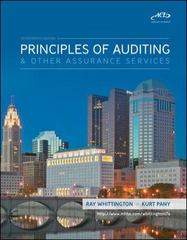Question
67) An abnormal fluctuation in gross profit that might suggest the need for extended audit procedures for sales and inventories would most likely be identified
67) An abnormal fluctuation in gross profit that might suggest the need for extended audit procedures
for sales
and inventories would most likely be identified in the risk assessment phase of the audit by
the use of:
A.Tests of transactions and balances.
B.An assessment of internal control.
C.Specialized audit programs.
D. Analytical procedures.
70) An auditor selects a sample from the file of shipping documents to determine whether invoices
were prepared. This test is performed to satisfy the audit objective of:
A.Accuracy.
B.Completeness.
C.Control.
D.Existence.
51) Which of the following is
not
used by auditors to establish the completeness of recorded assets?
A.Assessing control risk.
B.Tracing from source documents to entries in the accounting records.
C.Performing analytical procedures.
D.Vouching transactions.
50) Which of the following is not a general objective for the audit of asset accounts?
A.Establishing existence of assets.
B.Establishing proper valuation of assets.
C.Establishing proper liabilities relating to assets.
D.Establishing the completeness of assets.
40) Determining that receivables are presented at net realizable value is most directly related to which management assertion?
A.Existence.
B.Rights.
C.Valuation.
D.Presentation and disclosure.
47)Tests for unrecorded assets typically involve tracing from:
A.Source documents to recorded journal entries.
B.Source documents to observations.
C.Recorded journal entries to documents.
D.Recorded journal entries to observations.
48) Tracing from source documents forward to ledgers is most likely to address which assertion related to posted entries:
A.Completeness.
B.Existence.
C.Rights.
D.Valuation
43) The auditors must consider materiality in planning an audit engagement. Materiality for planning purposes is:
A.The auditors' preliminary estimate of the largest amount of misstatement that would be materialto any one of the client's financial statements.
B.The auditors' preliminary estimate of the smallest amount of misstatement that would bematerial to any one of the client's financial statements.
C.The auditors' preliminary estimate of the amount of misstatement that would be material to the client's balance sheet.
D.An amount that cannot be quantitatively stated since it depends on the nature of the item.
46) Which of the following is not an assertion that is made in the financial statements by management concerning each major account balance?
A.Completeness.
B.Rights and obligations.
C.Legality.
D.Valuation.
Step by Step Solution
There are 3 Steps involved in it
Step: 1

Get Instant Access to Expert-Tailored Solutions
See step-by-step solutions with expert insights and AI powered tools for academic success
Step: 2

Step: 3

Ace Your Homework with AI
Get the answers you need in no time with our AI-driven, step-by-step assistance
Get Started


